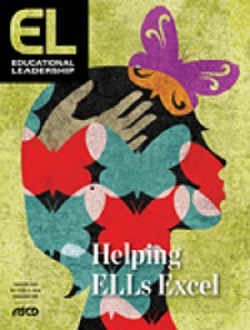“The Write Stuff”

The February issue of Educational Leadership Magazine, “Helping ELLs Excel”, was of great interest to me as a Keys to Literacy teacher trainer. Much of the work I do is with teachers who are from urban districts where the ELL population is quickly becoming the majority of the students they teach.
I was particularly interested in the article “The Write Stuff” by Carol Booth Olson, Robin Scarcella and Tina Matuchniak. This article reported the grim statistics of the 2011 NAEP scores in which only 1% of ELL students scored at proficient or above in writing. In addition to the demands of cognitive, communicative and contextual knowledge to be successful in college and the workplace, ELLs face additional linguistic, cultural and motivational challenges. It seems overwhelming but the key lies with providing educators with the “Write Stuff”.
The authors offered three research-based instructional strategies that promote academic literacy development for ELL students, the first having to do with motivation and engagement. They emphasized the importance of establishing a culturally relevant writing community where everyone’s voice is honored and celebrated. In addition, choice in learning tasks that are relevant and opportunities to collaborate with their peers increase students’ ownership of their learning. And let’s not forget the most important factor of all, the teacher. Those who develop strong ties to their students by getting to know their students’ background and culture use this information to link new learning to their prior knowledge.
Explicit teaching of strategy instruction was the next recommendation made and also supported by research (Conley, 2008, Graham and Perin, 2007, Short and Fitzsimmons 2007). They suggested instructing students with the use of cognitive strategies which include sentence starters so students have the language structures necessary for academic reading and writing. Another strategy that was recommended was The Do/What Chart which is helpful for students to analyze question prompts which includes circling the verbs and underlining task words that tell them what to do. This strategy is helpful to focus students’ attention on specific requirements for the writing assignment.
The Common Core Standards require that students have a command of academic language to read and write well in order to reach the rigorous grade level standards. ELL students, even when they are speaking with proficient English speakers, will unlikely acquire academic language through social interactions. Many ELL students aren’t exposed to academic vocabulary in their reading material either because many are reading significantly below their grade level. Therefore, it is crucial to include explicit academic vocabulary instruction. In addition, students need to be made aware of task, audience and purpose and be shown the difference between informal language and formal academic English. This was the authors’ final recommendation.
There are many similarities between what has been recommended in this article and Keys to Literacy professional development workshops in Comprehension, Vocabulary, and Writing. Our workshops provide strategies for reading, writing, and vocabulary instruction for all learners with scaffolds for each strategy that is supported by ELL research. I encourage all to visit our website to view professional development opportunities that are available. With the current projection that by 2020 one in four students in public school in America will be Latino, there is no better time than now to equip yourself with the strategies to help ELL students achieve academic success .
“The Ability to Write Well is Not a Frill but an Essential Skill for the Many” (National Commission on Writing for American Families, Schools, and Colleges 2003).

 Before becoming a Keys to Literacy trainer, Donna served as a classroom teacher, Reading Recovery teacher, reading specialist and literacy coach. Donna is also an adjunct professor at American International College (AIC), where she teaches a variety of literacy courses and supervises practicum students.
Before becoming a Keys to Literacy trainer, Donna served as a classroom teacher, Reading Recovery teacher, reading specialist and literacy coach. Donna is also an adjunct professor at American International College (AIC), where she teaches a variety of literacy courses and supervises practicum students.
Leave a Reply